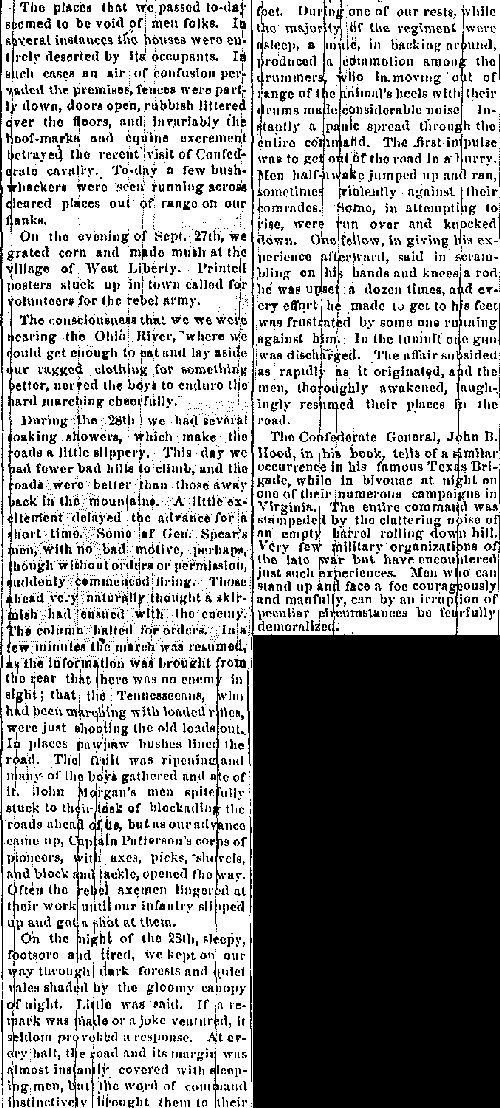| Camp & Field Page 38F | Camp & Field Index Page | 16th OVI Home Page | Camp & Field Page 38H |
The Camp & FieldArticles by Theodore Wolbach |
 Cpl. Theodore D. Wolbach |
The following image is taken from a book titled "Mortality and Statistics of the Census of 1850" in which it is believed retired Captain Rezin H. Vorhes, Company H, pasted over the pages a series of articles written by Cpl. Theodore D. Wolbach, Company E, titled "Camp and Field" and published, by chapter, in the Holmes County (Ohio) Republican newspaper from February 24, 1881 to August 17, 1882. The articles tell the story, in great detail and color, of the 16th OVI, from the inception of the 3-year regiment in October, 1861, through all its camps, battles and marches until it was disbanded on October 31, 1864. The articles pasted in the Vorhes book cover the first 35 chapters, published through October 20, 1881. All the remaining chapters were recently found in a Holmes County library by researcher Rob Garber who obtained copies, performed the transcriptions and provided to this website and which are also presented here, thus providing the complete work by Theodore Wolbach.
Throughout these articles click on the underlined white text for additional details.
The webauthor thanks 16th Ohio descendant Rob Garber for his excellent research on the Camp And Field articles and for performing the tedious digital transcription of those articles found on each page. The transcriptions were made to reflect the original articles verbatim, misspellings and all. Rob is the 3rd great nephew of Capt. William Buchanan, Company F, 16th Ohio, who served in the 90-day regiment as a private, re-enlisting in the three year regiment, and eventually making the rank of Captain of Company F. Thanks Rob!
Page 38G - Chapter 24 - September, 1862
 |
The places that we passed to-day seemed to be void of men folks. In several instance the houses were entirely deserted by its occupants. In such cases an air of confusion pervaded the premises, fences were partly down, doors open, rubbish littered over the floors, and invariably the hoof-marks and equine excrement betrayed the recent visit of Confederate cavalry. To-day a few bushwhackers were seen running across cleared places out of range on our flanks. On the evening of Sept. 27th, we grated corn and made mush at the village of West Liberty. Printed posters stuck up in town called for volunteers for the rebel army. The consciousness that we were nearing the Ohio River, where we could get enough to eat and lay aside our ragged clothing for something better, nerved the boys to endure the hard marching cheerfully. During the 28th we had several soaking showers, which make the roads a little slippery. This day we had fewer bad hills to climb, and the roads were better than those away back in the mountains. A little excitement delayed the advance for a short time. Some of Gen. Spear's men, with no bad motive, perhaps, though without orders or permission, suddenly commenced firing. Those ahead very naturally thought a skirmish had ensued with the enemy. The column halted for orders. In a few minutes the march was resumed, as the information was brought from the rear that there was no enemy in sight; that the Tennesseeans [sic], who had been marching with loaded rifles, were just shooting the old loads out. In places pawpaw bushes lined the road. The fruit was ripening and many of the boys gathered and ate of it. John Morgan's men spitefully stuck to their task of blockading the roads ahead of us, but as our advance came up, Captain Patterson's corps of pioneers, with axes, picks, shovels, and block and tackle, opened the way. Often the rebel axemen lingered at their work until our infantry slipped up and got a shot at them. On the night of the 28th, sleepy, footsore and tired, we kept on our way through dark forests and quiet vales shaded by the gloomy canopy of night. Little was said. If a remark was made or a joke ventured, it seldom provoked a response. At every halt, the road and its margin was almost instantly covered with sleeping men, but the word of command instinctively brought them to their |
feet. During one of our rests, while the majority of the regiment were asleep, a mule, in backing around, produced a commotion among the drummers, who in moving out of range of the animal's heels with their drums made considerable noise. Instantly a panic spread through the entire command. The first impulse was to get out of the road in a hurry. Men half-awake jumped up and ran, sometimes violently against their comrades. Some, in attempting to rise, were run over and knocked down. One fellow, in giving his experience afterward, said in scrambling on his hands and knees a rod he was upset a dozen times, and every effort he made to get to his feet was frustrated by some one running against him. In the tumult one gun was discharged. The affair subsided as rapidly as it originated, and the men, thoroughly awakened, laughingly resumed their places in the road. The Confederate General John B. Hood, in his book, tells of a similar occurrence in his famous Texas Brigade, while in bivouac at night on one of their numerous campaigns in Virginia. The entire command was stampeded by the clattering noise of an empty barrel rolling down hill. Very few military organizations of the late war but have encountered just such experiences. Men who can stand up and face a foe courageously and manfully, can by an irruption of peculiar circumstances be fearfully demoralized. |
| Camp & Field Page 38F | Camp & Field Index Page | 16th OVI Home Page | Camp & Field Page 38H |